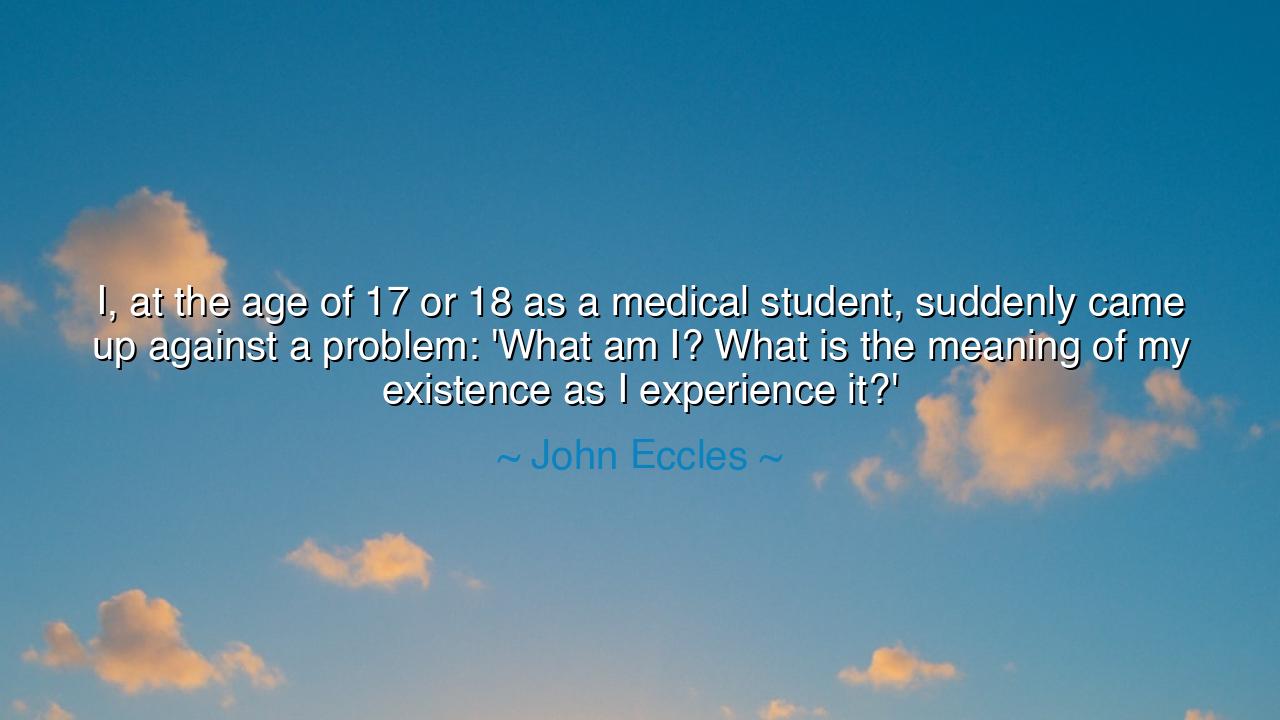
I, at the age of 17 or 18 as a medical student, suddenly came up
I, at the age of 17 or 18 as a medical student, suddenly came up against a problem: 'What am I? What is the meaning of my existence as I experience it?'






Hearken, O seekers of wisdom and voyagers of the soul, to the words of John Eccles, who confessed: "I, at the age of 17 or 18 as a medical student, suddenly came up against a problem: 'What am I? What is the meaning of my existence as I experience it?'" Within these words lies the timeless confrontation with selfhood, purpose, and the mystery of consciousness. Eccles, in the early stirrings of life and learning, encountered the profound question that has echoed through the ages: what is the nature of the self, and what meaning arises from our fleeting passage through this mortal world?
Since the dawn of philosophy, sages have pondered the essence of being. The ancients, from Socrates in the agora to the mystics of the East, recognized that the search for self-knowledge is the foundation of wisdom. Eccles’s question—“What am I?”—resonates with the Socratic call: “Know thyself.” It is in the recognition of one’s own consciousness, in the contemplation of existence, that the mind awakens to both wonder and responsibility.
Consider the story of René Descartes, who, in solitude and reflection, distilled his existence to the famous axiom: “Cogito, ergo sum”—I think, therefore I am. Descartes, like Eccles, faced the stark realization of selfhood, the undeniable presence of consciousness that cannot be ignored or postponed. In these moments, the student, the philosopher, the seeker is confronted with both the terror and the liberation of self-awareness.
Eccles’s reflection also illuminates the unique position of the medical student. In studying the body, the machinery of life, one confronts the tangible and measurable, yet the question of who experiences it—the conscious, thinking, feeling self—remains elusive. It is here, at the intersection of knowledge and mystery, that profound existential inquiry arises. Medicine teaches the mechanics of life, but the meaning of life is encountered within, in the stillness of reflection, as Eccles discovered.
History offers many examples of youthful confrontation with profound truth. Immanuel Kant, as a student, wrestled with the limits of reason, questioning what could be known and how the self apprehends reality. These formative crises, occurring often in the threshold of adulthood, sharpen the mind and deepen understanding. Eccles’s experience demonstrates that the recognition of existential questions is not a weakness but a rite of passage, a herald of intellectual and spiritual maturation.
The lesson is luminous: to encounter the question of selfhood is to step into the vast terrain of wisdom. One must neither flee from uncertainty nor accept superficial answers. Eccles teaches that grappling with existence—the “What am I?” of our conscious awareness—is the foundation for both moral action and intellectual pursuit. It cultivates humility, curiosity, and the recognition that knowledge of the body, of the world, is inseparable from knowledge of the self.
Practical action flows from this insight: pause to reflect on your own existence, question assumptions about who you are and why you act, and engage in the disciplined practice of observation and introspection. Seek understanding not only in study but in meditation, dialogue, and life experience. Let your inquiry shape your choices, your values, and your pursuit of knowledge.
O seeker of understanding, remember this: the question that stirred John Eccles at seventeen or eighteen is the spark of all wisdom. To ask “What am I? What is the meaning of my existence?” is to awaken to the vast mystery of consciousness and to enter the path of thoughtful, deliberate living. Let this contemplation guide your life, reminding you that self-awareness, courage, and reflection are the pillars upon which knowledge, virtue, and fulfillment are built.
I can also craft a narrative, oral-style version, with dramatic pauses and rhythmic emphasis, making it feel like an ancient teaching delivered aloud. Do you want me to do that?






AAdministratorAdministrator
Welcome, honored guests. Please leave a comment, we will respond soon